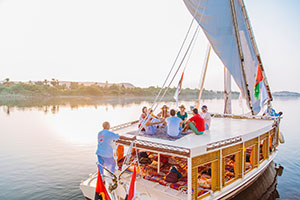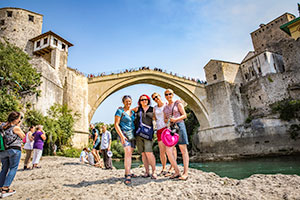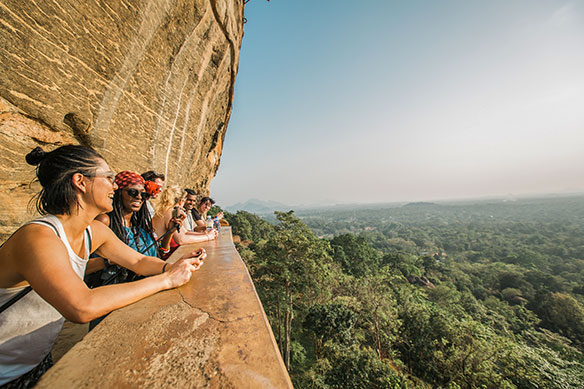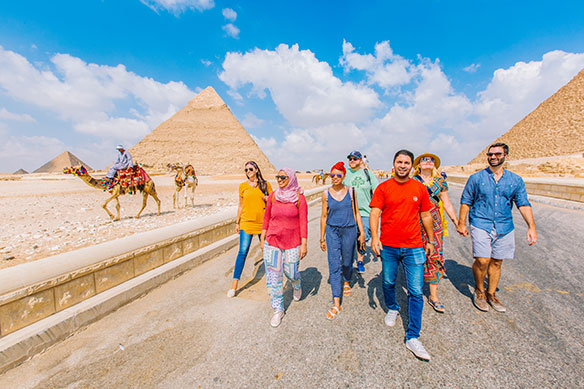
Closer to home
Intrepid finding new ways to give travellers what they want in a pandemic world
ANN RUPPENSTEIN
August 6 was a monumental day for Intrepid Travel. For the first time since COVID-19 brought travel to a global halt in March, the small group adventure travel company officially departed on a tour with six travellers in Greece.
“While this is by no means a return to normal, we do hope these trips will serve as a source of hope and inspiration for the industry after several months without travel,” James Thornton, the CEO of Intrepid Travel, tells Canadian Travel Press.
In direct response to local restrictions beginning to lift following the COVID-19 outbreak, Intrepid launched a new collection of “Closer to Home” tours designed to give travellers the opportunity to explore closer to home while many international borders remain closed.
“With the majority of international borders still closed, we’ve shifted our focus recently to develop new product catered to local travellers who are interested in exploring domestically,” he explains. “These new ‘Closer to Home’ tours, which are curated by locals for locals and tailored to each country’s individual restrictions, includes over 75 multi-day tours in Australia, New Zealand and Europe.”

Thornton
“This new category is a first for Intrepid, in which groups immerse themselves in one location, in handpicked accommodation ranging from small boutique properties to glamping, with nearby experiences,” he says. “These retreats celebrate ‘slow travel’ and allow adventurers to engage with the surrounding communities away from the crowds and in a more controlled setting.”
Another option for travel agents looking to grow their domestic business is through day tours.
“From now through the end of 2020, day tours in 16 North American cities will re-launch with a combination of standard group tours, private tours and create-your-own adventures through Intrepid Urban Adventures,” he says.
Devastating impact
As COVID-19 made its way across the globe, Thornton says Intrepid searched for the right words to describe what was unfolding.
“Most of us settled on ‘unprecedented,’ but for too many, it has been nothing short of devastating. This crisis has reached almost every corner of the world. Some of its impacts are yet to be seen, but one thing is certain: the communities who rely on tourism have a long and difficult road to recovery ahead,” he says.
Although travel is largely at a standstill, he says they can’t forget about the places that depend on it.
“From Cambodia to Morocco, communities that our partners work in are left without income or other support,” he says. “This is why we launched our new Communities in Crisis campaign through The Intrepid Foundation, which has raised over $9,000 AUD for communities around the globe to date.”
While international border openings and the state of the COVID-19 crisis continue to be uncertain, he’s positive that travel can and will come back even stronger and more responsible than it was before.
 “Travellers are putting more thought into where they will go and on how they will travel post-pandemic. Without having the immediate access to explore the world that we once had, planning is becoming more intentional as people are treating travel less as a right, and more as a great privilege,” he notes. “We’re finding that our customers are still eager to explore the world, they’re simply booking their travel further out than before. The majority of our travellers globally are booking their next holiday in the latter half of 2021, particularly between July and September.”
“Travellers are putting more thought into where they will go and on how they will travel post-pandemic. Without having the immediate access to explore the world that we once had, planning is becoming more intentional as people are treating travel less as a right, and more as a great privilege,” he notes. “We’re finding that our customers are still eager to explore the world, they’re simply booking their travel further out than before. The majority of our travellers globally are booking their next holiday in the latter half of 2021, particularly between July and September.”
Rebuilding stronger
As COVID-19 brought the travel sector and the global economy to a halt, Thornton says Intrepid is using this period of stagnation to focus on rebuilding the travel industry more ethically and sustainably.
“Moments like the transformation of Venice’s canals and sea turtles thriving in Thailand amid the pandemic’s worldwide shutdowns shine a light on tourism’s impacts when it’s at full force. The industry needs to emerge from this crisis with impactful strides to ensure there’s a world to explore for future generations of travellers,” he says.
“As a B-Corp certified tour operator and a company that has dedicated a lot of resources towards initiatives such as combatting the climate crisis and advocating for the world’s people and animals, we feel it’s our obligation to use our insights and learnings to assist others in doing their part towards a sustainable reset of the tourism industry.”
One recent example was launching an open-sourced guide for travel companies to decarbonize their travel businesses, which they will continue to build upon.
“Advocating for net zero emissions by 2030 is one of the key areas that we have identified as critical to a responsible rebuild of the travel industry, along with ending exploitative wildlife tourism, establishing stronger governance and compliance, and empowering communities and supply chains,” he says. “For example, this month Intrepid Travel – as the first global tour operator to ban elephant rides – is teaming up with World Animal Protection to release an open-source Animal Welfare Policy Toolkit that will include tips on how to draft and implement more animal-friendly practices within a tourism organization, as well as an editable policy template for businesses – to ensure animal exploitation in tourism ceases for good.”
Sustainable practices
Pointing to the fact that we are in a climate crisis, Thornton says it is the responsibility, and obligation, of businesses in the travel sector and beyond to make real impactful changes.
“At the moment, COVID has stopped the world – keeping people indoors for weeks and months at a time because it places a direct impact on our health right now,” he says. “Climate change is similar, except we won’t feel the real dire impacts of it for another 30 or 40 years. But there will be no vaccine for climate change when the time comes, like there may very well be soon for COVID.”
Although the industry has made great strides in recent years, he says travel contributes to roughly 8% of global greenhouse gas emissions.
 “We understand every business has its own individual challenges and priorities – particularly during a time that is completely unprecedented,” he says. “But we hope that companies within the travel industry will understand the severity of the situation.”
“We understand every business has its own individual challenges and priorities – particularly during a time that is completely unprecedented,” he says. “But we hope that companies within the travel industry will understand the severity of the situation.”
Overcoming obstacles
Looking to the future, Thornton says those in the industry must not forget about the issues tourism had caused and was facing before the pandemic, such as overtourism.
“Many popular places around the world such as Venice and Dubrovnik were feeling tremendous stress with the influx of tourists they were seeing each day,” he says.
“There had been great strides made before COVID-19 hit with businesses and destinations re-evaluating their own practices and setting more strict visitor limits, and it’s important we don’t overwhelm destinations once borders re-open.”
As travel slowly becomes a reality again, Intrepid introduced a new Flexible Bookings policy to make travellers feel at ease when booking their trips with all of the uncertainty in the industry.
“We’ve found that our customers’ main concerns for booking holidays right now are around safety and being unsure about when international borders will reopen for leisure travel,” he explains. “The new policy permits changes to travel plans 21 days before a scheduled departure, allowing for new travel dates or an entirely different trip, with no change fees. Deposits are the only cost travellers will pay until 21 days before departure, and if plans change, that deposit will be transferred toward another trip.
Travellers can also reserve a trip without payment for up to five days.”
All Intrepid trips will now be operated under new Safe Travel protocols developed and endorsed by the World Travel & Tourism Council.
“Additional measures, in line with government health advice and with global health authorities, will include enhanced sanitation, contactless technology solutions, physical distancing across accommodation, transport and restaurants as well as pre-trip and on-trip health screenings,” he says.
In general, Thornton says the tour operator believes the travel industry shouldn’t be aspiring for things to go back to normal following the pandemic.
“But rather work together to redefine what normal means, and use this time as a rare chance to think about how we travel, and how we can aim to be more ethical and sustainable travellers and global citizens in the future,” he says. “We should be working towards a travel industry which benefits the most vulnerable people on our planet, protects the natural world and all the animals and humans who inhabit it, and heals our planet from the damage we’ve caused.”


